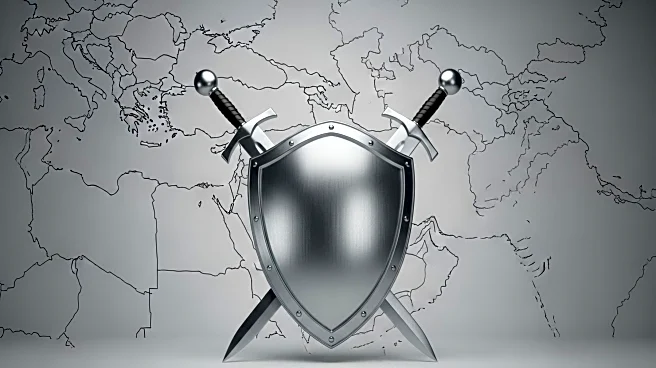What's Happening?
A strategic mutual defense agreement has been signed between Pakistan and Saudi Arabia, marking a significant shift in regional security dynamics. The deal, signed by Prime Minister Shehbaz Sharif and Saudi Crown Prince Mohammed bin Salman, stipulates that an attack on one country will be considered an aggression against both. This agreement comes in the wake of an Israeli attack on Hamas leadership in Qatar, a key U.S. ally. According to an intelligence assessment, Saudi Arabia is moving beyond U.S. security guarantees, leveraging Pakistan's manpower, nuclear credibility, and combat experience. The deal is seen as a move by Saudi Arabia to assert its leadership in the Islamic world, sending a message to Iran and Turkey, while also balancing regional power dynamics.
Why It's Important?
The defense pact between Pakistan and Saudi Arabia has significant implications for regional and global stability. For Saudi Arabia, the agreement is a strategic maneuver to maintain its influence in the Islamic world and counterbalance the growing ties between the UAE, India, and Israel under the Abraham Accords. For Pakistan, the deal enhances its strategic position, potentially securing new funding and stabilizing its economy. The agreement also positions Pakistan as a key player in the Organization of Islamic Cooperation (OIC), potentially reviving its influence. For India, the pact is concerning as it may lead to a revival of an 'anti-India' bloc, affecting India's strategic interests in the Middle East.
What's Next?
The defense agreement is likely to lead to a realignment of regional alliances, with Saudi Arabia and Pakistan strengthening their military and strategic cooperation. This could result in increased tensions with Iran and Turkey, as well as a potential shift in the balance of power in the Gulf region. India may need to reassess its diplomatic and strategic approach in the Middle East, particularly in light of the potential revival of an 'anti-India' bloc. The agreement may also prompt other regional players to reevaluate their alliances and security strategies.
Beyond the Headlines
The defense deal highlights the complex interplay of regional politics, religious leadership, and strategic interests in the Islamic world. Saudi Arabia's move to control the broader Muslim narrative underscores its role as the guardian of Islam's holiest sites, Mecca and Medina. The agreement also reflects the shifting geopolitical landscape, where traditional alliances are being redefined, and new power centers are emerging. This development could have long-term implications for the balance of power in the Middle East and South Asia.









